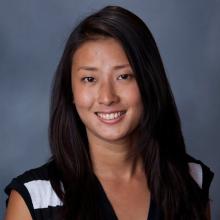July 2021 Spotlight on SRCD U.S. Federal Policy Fellow: Dianna Tran, Ph.D.
Dianna Tran is an SRCD Federal Executive Branch Policy Fellow who is placed in the Office of Planning, Research, and Evaluation (OPRE), Administration for Children and Families (ACF), U.S. Department of Health and Human Services (HHS).
As I reflect on the first 10 months of my SRCD Federal Policy Fellowship experience at the Office of Planning, Research, and Evaluation (OPRE), within the Administration for Children and Families (ACF), U.S. Department of Health and Human Services, I feel such gratitude for the opportunity to be working at the intersection between research and policy, especially during such a unique and pivotal time. The COVID-19 pandemic has been a traumatic experience for many and science policy has played an important role in protecting and supporting human lives in many ways, such as developing and distributing vaccines and adjusting health care practices. Inequities have been exacerbated and given national attention, and child care and early education have become more of a priority for the new administration. Thus, it has been especially rewarding to work within science policy on child care and early education equity issues during the Biden-Harris administration.
Being placed at OPRE has offered me the unique opportunity to learn how policies affect research and evaluation and how research findings can inform policy and practice. During my fellowship year, I have supported rigorous research and evaluations that are relevant to the priorities, interests, and needs of Congress, ACF, HHS, and federal program offices (e.g., Office of Child Care, Office of Head Start). My involvement in various contracts, grants, and workgroups has given me valuable experiences and perspectives.
A particularly rewarding project I have been a part of is the Building and Sustaining the Early Care and Education Workforce (BASE) project. This project aims to examine and evaluate promising strategies to support recruitment and retention of the early care and education (ECE) workforce. This is a timely project as occupational turnover for ECE workers has been a significant concern that has been exacerbated by the pandemic. As the ECE workforce is largely comprised of women of color, this is an equity issue as well. High stress, burnout, low compensation, and limited training and professional development opportunities are some factors that may contribute to turnover. Currently there is limited evidence to demonstrate the effects of these factors. Thus, this project intends to use rigorous evaluation to investigate policies and strategies that have been implemented to support staff retention and promote care for children. Through this evaluation OPRE hopes to provide an evidence base that program offices can use to guide policy and technical assistance that supports and retains the ECE workforce.
Additionally, I am involved in OPRE’s Race Equity Workgroup and participating in this workgroup has given me insight into additional perspectives and opportunities to contribute to OPRE’s understanding of how research and evaluation can be made more equitable at multiple levels. For example, intentional engagement and collaboration with community stakeholders, incorporation of family voice, and use of strengths-based and culturally competent research frameworks can further enhance equity within research. Furthermore, ensuring grant and contracting processes are equitable and implementing strategies to increase the number of successful non-traditional applicants provide important opportunities to advance equity in the research workforce. As we move towards furthering equity, the work of the OPRE Race Equity Workgroup will shape the ways research and evaluations are conducted within our research office.
I am extremely grateful to the SRCD Policy Fellowship Program for this opportunity to gain experience and insight related to child and family science policy in the federal government. I have been able to use the skills and training I gained from my doctorate, adapt to a new working environment, and learn new skills to support evidence-based policymaking. Furthermore, the fellowship has allowed me to connect with many compassionate, intelligent, thoughtful colleagues who I appreciate and have undoubtedly learned valuable skills from.
